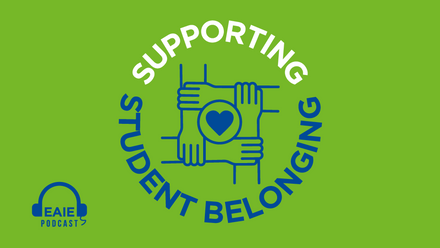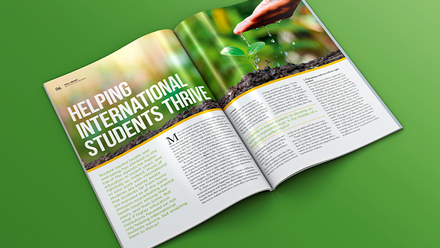Supporting well-being throughout the international student journey

Mental health is a phrase we’ve heard extensively over the past few years, as it is an urgent matter in many areas. The higher education field is no exception – quite the opposite actually!
Students (and staff) face diverse well-being issues such as family problems, financial difficulties, feelings of isolation, social pressure, anxiety and stress. Attending university can be stressful, especially in a foreign country: it involves significant lifestyle changes, especially for international students who, in most cases, have to adjust to a new environment, interact with new people and live away from home. Add a global pandemic to the mix and you quickly understand why higher education institutions (HEIs) should be actively looking into all the tools that could help them address these issues as early as possible to better support their international communities.
Key statistics on the mental health of international students
The 2022 Annual International Student Survey – conducted by Interstedelijk Studenten Overleg (ISO) in collaboration with the Erasmus Student Network (ESN) and Dutch Student Union (LSVb) – found that 59% of international students in the Netherlands reported struggling with their mental health. Additionally, according to the 2022 i-Graduate Global Student Experience survey, 35% of students reported feeling “always or quite often stressed or anxious” in 2021, a percentage point higher than in 2020 and four percentage points higher than before the pandemic in 2018. An additional 42% of international students are worried they might not be able to complete their studies.
Even when they face numerous challenges, only a modest percentage of foreign students access mental health services during their studies
However, even when they face numerous challenges such as these, only a modest percentage of foreign students access mental health services during their studies. Fortunately, student well-being and mental health have become top-priority issues for many institutions. But, even if higher education leaders have implemented significant measures to help, there is still a lot to do. How can HEIs ensure their international students’ well-being through every stage of the student journey?
On arrival: organisation and information
Ensure a warm welcome for international students arriving on your campus: when new students arrive, make sure they have a support system. They need to adapt to a new culture and perhaps learn a new language, which could be an obstacle to making friends and could lead to isolation. Having an organisation on campus focusing on international students is a great way to give them your warmest welcome. Moreover, online student communities are an easy way to quickly get to know fellow students.
One of the common challenges facing students is lack of mental health literacy, whereby many fail to recognise different types of psychological distress (such as homesickness) or specific disorders (such as anxiety or depression). To counter this, HEIs can use a (digital) tool that regularly sends out surveys to students, asking about their well-being. The point is to communicate proactively, instead of reactively, and encourage students to have meetings with counsellors, therapists or other support providers as needed.
Make sure students have access to information and resources they need about each stage of their studies. Institutions should also strive to make resources available in multiple languages, as many international students do not speak English as their first language. Check if students have access to the most important resources like accommodation opportunities and support, class schedules and exam dates. Online applications can offer support as they provide students with information such as digital campus maps, online grades and push notifications when an important deadline is coming.
Encourage students to participate in campus experiences and activities. Give students information about the campus community: (international) student clubs, organisations, associations, campus events etc. By getting international students involved in campus events and organisations they will create a network, make friends and feel at home in a foreign country. By using a mobile application, you can effortlessly promote activities by sending push notifications to students and create a vibrant campus community.
During studies: communication and engagement
Guide students through their first classes, assignments and exams, giving them tips and advice to succeed in their first year. Make sure all international students have a mentor with whom they can talk about their issues and someone that will help them find what they need. Be aware that in some cultures there is shame and stigma around discussing one’s emotions; try to break that stigma by finding culturally sensitive ways to bring issues out into the open.
Keep encouraging students to take part in the campus community to maintain and develop their sense of belonging. Especially for international students, it is important to have a strong community support network. These networks help them adjust to their new setting, and they act as a resource when students are in need. Organise networking events and promote them through an app so that every student is aware of such events and can register easily.
Create a culture of well-being. It is very important to continuously pay attention to international students’ well-being on multiple levels (emotional, physical, social, intellectual, financial). Some universities already offer a range of support services to international students, but not all students will be aware of this; HEIs should thus market these services widely to increase the reach and create greater awareness.
After graduation: advice and support
Prepare future graduates for their professional lives: provide them with tools and resources to build their resumes (which they may need to do in a foreign language). Develop their soft skills, teach them about the working environment in your country, give students career advice and guide them through the steps they need to follow.
Give career advice. Write an international student career planning guide including tips on how they can successfully prepare for job searching in your country. Make sure that the guide is available in different languages and make it easily accessible online.
Help students learn how to network: organise workshops with professionals and give them the opportunity to interact with alumni. The latter gives international students resources that can help them post-graduation, which is very important as they need to grow a professional network from scratch.
Lastly, help students find out about their options post-graduation and decide what they will do next. Connect the students with recruiters that recruit for English-spoken jobs or jobs in the native language of the student. This will make it easier for them to get a head start in their new country.
Given the many mental health challenges international students face today, HEIs should strive to support them at each stage of their educational journey, from arrival on campus to seeking employment after graduation. Developing new ways to reach out to students online and via mobile apps is a powerful tool, but however universities approach supporting their international students, communication, community and engagement should all be at the core of their strategy.






